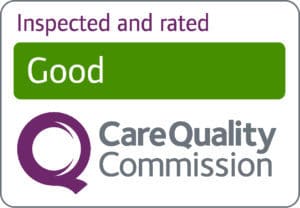
We know that most of the families who need care need it quickly and that most of them haven’t been through the process before. We want to ensure that you have the appropriate information, so that you are able to make an informed decision.
We understand that when you’re in a state of high emotion and anxiety, it’s important that you consider your options on a like-for-like basis, and when comparing care providers just on price, you may overlook the key difference that is regulated vs unregulated CARE. Some organisations might claim to be a care company, however not all of them are offering the full, regulated service you should receive.
Care services in England are monitored by the Care Quality Commission, or CQC, which carries out regular inspections covering the fundamental standards of quality and safety to make sure your loved ones are getting the care they need. Companies registered with the CQC also need to adhere to strict guidelines and procedures in order to provide good quality care.
However, some care companies are not regulated. To make sure, you can ask them to send you a copy of their CQC report. If they cannot then they may well be an introductory agency where their responsibilities as a provider are likely to be very different.
Why a company might not be regulated
Although the CQC regulates and monitors companies supporting with person-centred care such as personal care, showering, continence care, dressing and so on, they do not regulate companies offering:
- Shopping
- Household tasks
- Cleaning
These non-regulated care companies often act as introductory agents, providing personal assistants to carry out light tasks around the house. But these companies are not required by law to be regulated unless their duties lead to more hands-on care.
Nowadays, it relatively easy to set up a company, and care is no exception. However, they must be registered with the CQC before they can carry out any form of personal care or nutrition and hydration support.
The dangers of a non-regulated care service
Non-regulated providers do not have a regulatory body to answer to, they do not have the checks and balances in place to ensure that the people they care for are kept safe from harm, abuse and neglect. They also have no legal obligation to employ their carers, which means that you as the customer will be responsible for their wages, insurance, and other paperwork or compliance.
The Health & Social Care Act 2008 also states that “providers must provide sufficient numbers of suitably qualified, competent, skilled and experienced staff to meet the needs of the people using the service at all times” in order to be regulated, however the CQC cannot directly prosecute a provider for breaching this regulation. Rather, the CQC with take what is known as ‘regulatory action’.

Helping Hands is a regulated fully-managed service, meaning that the CQC monitor our practices and from the moment we take an enquiry through to delivering care to your loved one at home, the process is managed and monitored by our management team to ensure that you receive a dignified safe service that meets your needs and preferences.
Conversely with a non-regulated service, once an enquiry has been placed and a carer allocated, this is where the partnership concludes – it’s a very transactional purchase and the management of the carer then falls onto the person needing care and their families. This includes making sure the carer is paid, sorting any pension contributions, holiday pay and finding an alternative one if they should fall ill or not meet the families standards for any reason.
Every regulated business has to be registered with the CQC and follow its code of conduct at all times. Regulated providers also have a nominated person to liaise with the CQC on any issues which need resolving. Without this management system, there is nobody to check the carer is doing their job properly. There are also issues when it comes to finding the carer themselves; a non-regulated service may not carry out the background checks that a regulated provider would.
In 2017, the CQC published a report which found that although the majority of care support was rated as ‘good’ or ‘outstanding’, there were still providers which failed on safety, highlighting the need for proper regulation and management.
There are also issues when it comes to finding a carer yourself; a non-regulated service may not carry out the background checks that a regulated provider would. A regulated care provider has to check with the ‘Disclosure and Barring Service (DBS)’ that we are making safe recruitment decisions, that there’s nothing in the carer’s background which would impact on their ability to deliver a safe service.
A regulated care service provides peace of mind

These inspections are carried out on a regular basis and the provider, by law, must display their most recent rating on their website and office premises. You can view our current rating here.
Every provider must have a registered manager, according to The Health and Social Care Act 2008. And these managers themselves go through a ‘fit and proper persons’ assessment before they can take sole responsibility of the service.
Regulated providers like ourselves, unlike non-regulated companies, also directly employ their carers directly. With a non-regulated service, you will simply be introduced to a carer and then you’ll be the one responsible for paying them and sourcing cover if they are ever ill or have to leave for any reason.
Not only that but you will essentially become their employer and have to find the right insurance and contracts. With a regulated service, all this pressure is taken off your shoulders.
To find out more about Health and Social Care Integration, please click here.
Quality-assured training and best practices
Many regulated providers offer in-house training to their carers before they are sent out to work in their local communities. This means that you can be assured that they have the knowledge required to support you or a loved one in the manner which meets your needs.
Each company will have its own set code of conduct, however the CQC also has its own fundamentals of quality care, including:
- Person-centred care. Is the care tailored to your needs and preferences?
- Dignity and respect. Making sure you have your personal space and privacy when you want them
- Safety. You should never be made to feel unsafe in your own home
- Staffing. Does the provider have the right staff for your needs?
- Complaints. Can you get in touch with the right department should you need to raise an issue?
Your next steps when looking for care
There’s nothing stopping you from using a non-regulated service. But for added peace of mind, a regulated provider with a fully-managed service will allow you to call upon an experienced team to help out in an unexpected emergency, such as a carer falling ill, and ensure you or a loved one are always safe and well-cared for.
The CQC’s reports on all registered home care providers and care homes can be found online and you can always ask the provider what their rating is.
It’s important to remember that there is no one-size-fits-all approach when it comes to care, so please speak to us to learn more about our regulated service and support.
